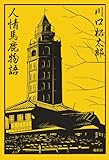
"Mistress Oriku: Stories from a Tokyo Teahouse" is simply a fantastic book. A pure pleasure to read, author Matsutaro Kawaguchi has opened a window to a time in Japan's past when delight in arts and culture were refined and simplified, and when a simple bowl of chazuke, green tea over rice topped with fresh clams, could be considered a work of art.
Almost in the Jane Austen style, "Mistress Oriku" tells the story of a women from the Yoshiwara pleasure quarters who was raised from being a brothel-owner's mistress to being the proprietor of an elegant teahouse, whose customers were the leading artists and actors of the day. She falls in and out of love, experiences struggles and floods, but maintains her composure and enjoys herself along the way, taking from life the pleasures that it has to offer without guilt or complaint. Oriku's story is not one of the pathos of a prostitute, and there is no moral condemnation or political lesson to be had. There is just the joy in things beautiful and sensual, be they the warmth of a human body or a steaming cup of heated sake.
Mixing fact with fiction, Kawaguchi has populated Oriku's teahouse with the greatest figures of kabuki, rakugo, gidayu chanting and other refined entertainments from the era. Although they will probably not be familiar to the reader, the depth of information lends a air of authenticity to the story. Like an Austen novel, it makes one want to go back to that half-fantasy time, and experience the love and sensation forever lost in the modern vulgar era. To help guide you, a glossary is included in the back of the book that gives the background on several of the figures that drift in and out of the story, both real and imaginary.
Royall Tyler's translation is flawless, as one has come to expect from him, and one can even sense the underlying Japanese phrases in his English. The rhythm and flavor of the language has been maintained, as has been the subtlety and beauty. His translation is as much a work of art as the novel itself.
The only slight complaint about "Mistress Oriku" is the ending. The entire book is one of beauty and pleasure, and only at the end does the harsh reality of the encroaching modern world rear its ugly head. While this may be honest historically, it represents a sharp departure from the tone of the rest of the novel, and seems to be included only because of the rule that Japanese novels are not allowed happy endings.

作者によれば「江戸っ子」という人種は大正時代に消滅したらしい。大正時代までの東京人は「江戸っ子」と呼ばれるのを得意にしており、「江戸っ子」に対しては、気前が良くて、任侠精神があって、人情の機微が判った、等など、好い事ずくめの褒め言葉が並んだらしいが、それは言い換えると馬鹿々々しい見栄とやせ我慢に終始している人たちで、このような脆弱な都会人はこの世知辛い世の中を乗り切れず消滅したとのこと。
前置きが長くなったが、本書はそんな馬鹿々々しいほどまで人情に厚い「江戸っ子」を題材にした短篇小説集で、12編の短篇が収められている。講談師・悟道軒円玉を始めとする登場人物は、著者の周りに実在した人物ばかりで、著者の分身も「信吉」という名前で登場する。従って読んでいると実話をもとに書かれているのではと思わせる作品が多い。
作品の内容はタイトル通り講談師など当時の芸人にまつわる人情話が並んでいるが、基本的なテーマはすべて男と女の交情だ。強い印象を残すのは女達で、逞しく生きる女が時に男を育て、時に駄目にするなど様々なパターンの関係がリアルに描かれており、男女の交わりの根源的な部分を見たような気持ちにさせられる。
江戸っ子には「分をわきまえる」という意識が強く、いくら相手のことが好きでも、身分が釣り合わない場合には身を引く、それがお互いにとって幸せだと考えていたようだ。ただしそれが尾を引いて、めそめそするわけではなく、特にその後は割り切って生きる女達の姿は爽やかだ。
12編の短篇全てに男女の深い関係が描かれており、面白くて、ほろりとさせられて、そして考えさせられる作品揃いである。

吉村公三郎監督には「夜の〜」というタイトルが3つあり、これはその二つ目です。水商売の世界を描き、女の戦いを描く風俗もの。亡くなった船越英二の代表作の一つとしてテレビにスティール写真が何度も出ていました。
なお、クレジット表示にはないですが、田宮二郎が楽士役で登場します。台詞もちゃんとあります。当時まだ柴田吾郎と名乗っていました。
あとは「夜の素顔」もDVDにして欲しいです。これだけスコープ画面で内容は舞踊の世界でした。

※帯の広告文の転載
哀しく美しい至上の愛
年上の女との恋に命を賭けた歌舞伎役者の儚い生涯。華やかな舞台と複雑な人間模様。巨匠川口松太郎入魂の書き下ろし傑作長編
恋文
私は生涯に一度だけ男に惚れた経験がある。先代尾上梅幸の実子尾上栄三郎氏が惚れた相手だ。生きていれば梅幸を名乗ったであろうが二十六歳で死んでいる。六代目菊五郎の相手役をしながら将来の大成を期待されつつ世を去った。舞台姿の可憐な美しさは今でもはっきり目に残っているが――一度は書いて置きたかった恋文でもある。 ―あとがきより―

子供の頃に映画館で見たのですが、自分の手元に置いておきたい作品なので購入致しました。
日蓮の一般的な事は全て作品に紹介されていて、日蓮の概要はこの作品を見れば解ると思います。
日蓮に興味のある方にはお勧めします。
映画としても素晴らしく、日本映画の良さが味わえる一作品です。
|
